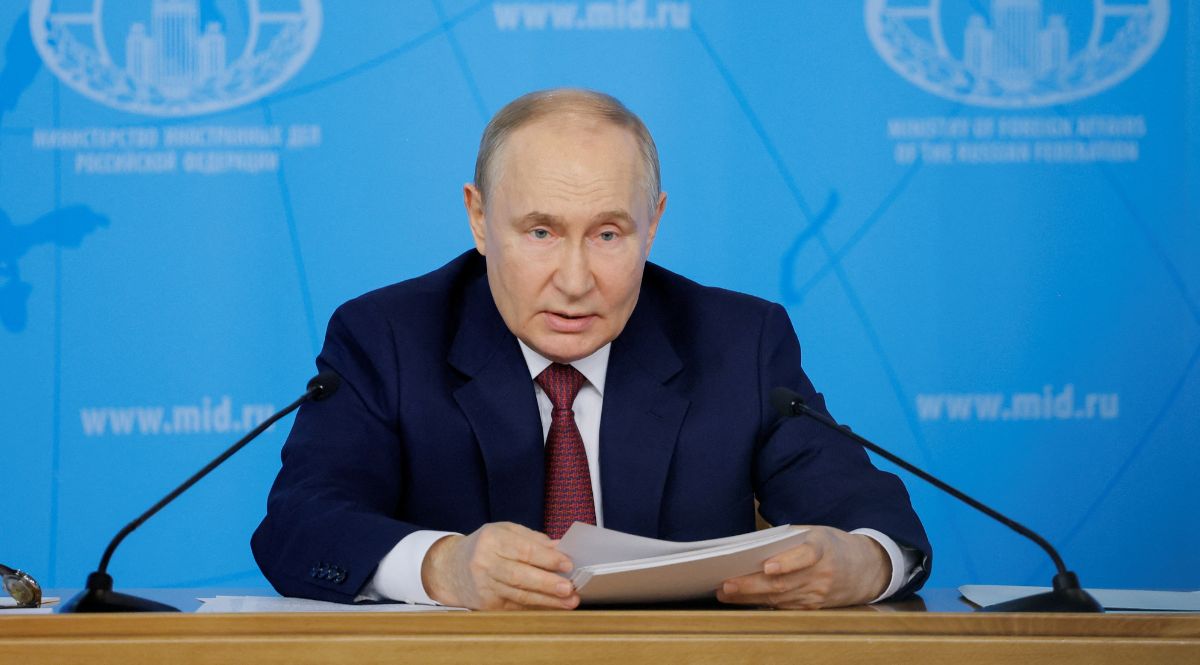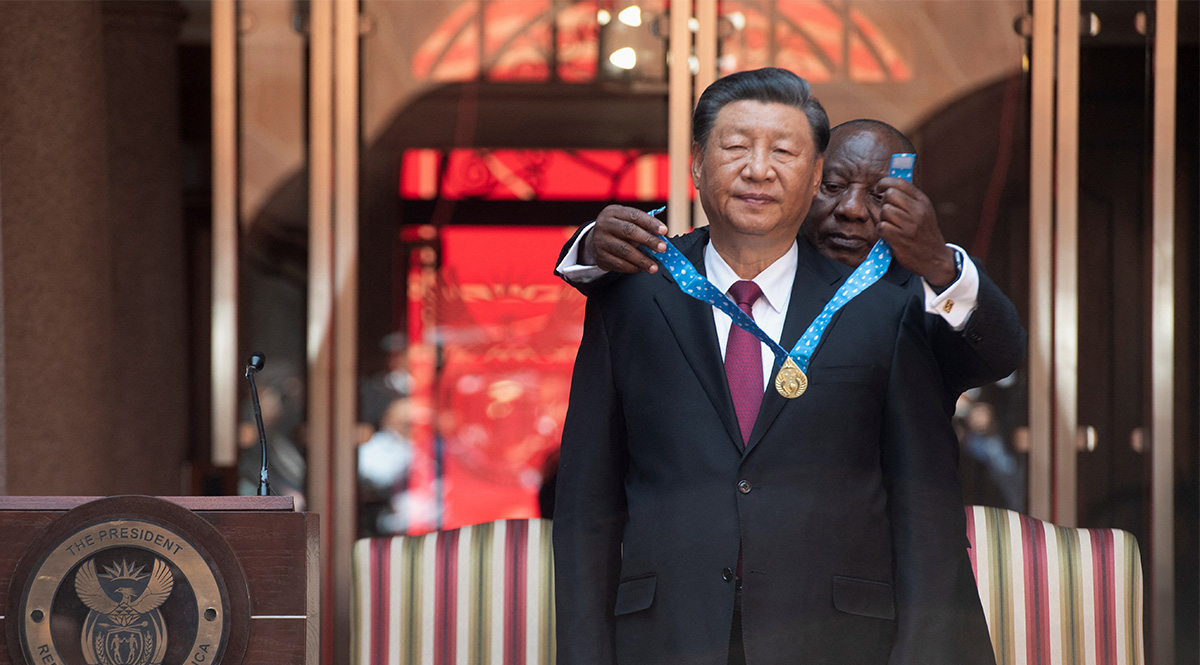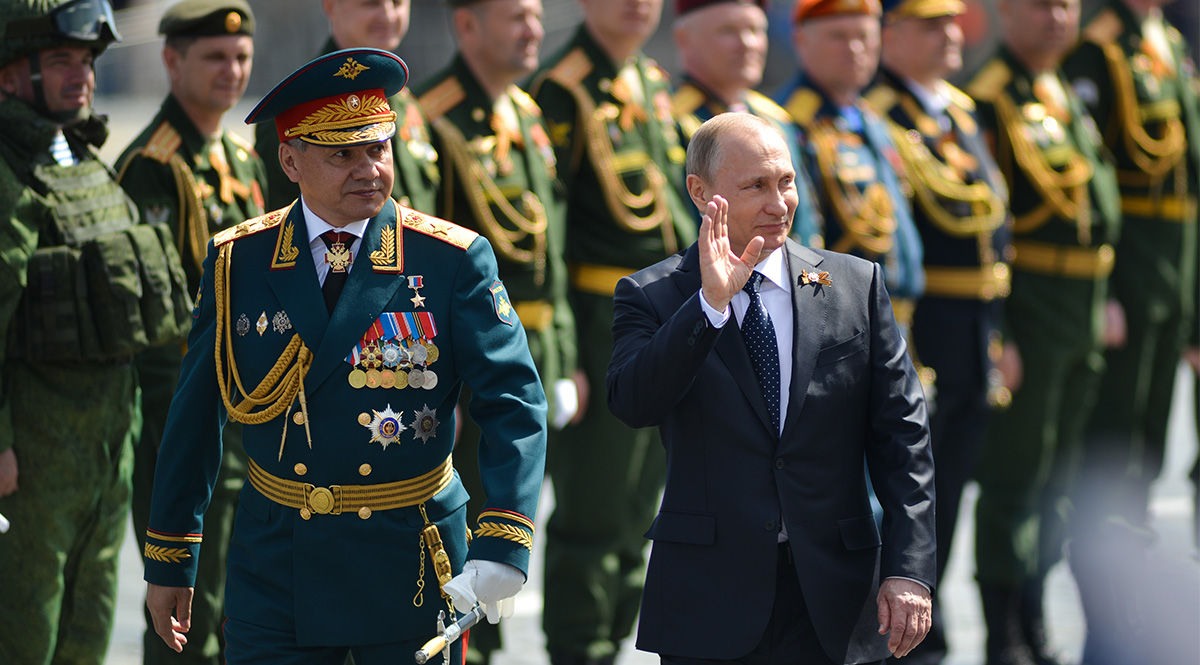Russia Offers Vision of a New Global Security Architecture
One of the goals of Russian foreign policy is to create a new global security architecture, which requires “overthrowing the hegemony of the U.S. and other Western states and shaping a multipolar world”, according to the Russian rhetoric. They also use it in discussions about ending the war in Ukraine, as well as towards the states of the Global South that Russia wants to convince of its vision of a new international order. These ideas are particularly dangerous for countries such as Poland, which Russia assumes are members of a “second-class” defence alliance, devoid of credible security guarantees. It is therefore essential to oppose the Russian narrative in the international arena.
 Maxim Shemetov / Reuters / Forum
Maxim Shemetov / Reuters / Forum
On 14 June, in response to the peace conference on Ukraine, Vladimir Putin announced a counter-proposal to end the war, stipulating, among other things, that Crimea, Sevastopol, and the regions annexed in the 2022 pseudo-referendums are to be officially recognised as Russian, and that Ukraine must declare that it has abandoned its intention to join NATO. He also stated that Russia, being a superpower responsible for global stability, is ready to create an indivisible Eurasian security system with the West. Russian expectations of a change in the security architecture—not only in Europe—have grown since it issued demands to the U.S. and NATO in December 2021. Acceding to these stipulations would give Russia not just influence but also the right to interfere in the security of the former Soviet states and the country’s comprising NATO’s Eastern Flank, while the undermining of the dominant position of the West would allow for a revision of the current global security order, as advocated also by China and some of the Global South.
A Multipolar World in the Russian Concept
The actions of Russian diplomacy and statements by key politicians have demonstrated that Russia under Putin aims to create a multipolar international order based on spheres of influence. In this concept, the world should reject the political, economic, religious, and cultural “hegemony of the West”. Russia considers China to be its greatest ally in promoting and realising this vision, but it is also supported by other states, including Belarus and North Korea.
However, the Russian concept is formulated in such a way as to be attractive mainly to the countries of the Global South, as it presents the idea of international relations as more equitable, ensuring that each region has equal weight and influence in shaping the norms of international law. Its narrative seeks to exploit anti-American and post-colonial resentment.
One of the tools Russia uses to promote its vision of a new security order is the network of international organisations headed by the UN system. On the one hand, Russia assesses the UN as just another institution of the Western world, while on the other hand, it opts to leave it in place, as its structure is conducive to the implementation of Russian ideas—ostensibly each member has one vote, but there are privileged states, such as the permanent members of the Security Council, who have the right to shape international reality according to their interests.
To promote its ideas, Russia uses regional formats directly related to the post-Soviet area, such as the Collective Security Treaty Organisation (CSTO) or the Eurasian Economic Union (EEAU), which help it consolidate a sphere of influence in the region. Growing in importance are the Shanghai Cooperation Organisation (SCO) and BRICS, which are promoted and used as alternatives to Western platforms for international cooperation. Other diplomatic activities are also important, such as regular Russia-Africa summits (the last one was held in July 2023) and bilateral contacts with China, Belarus, Iran, and North Korea, which present similar approaches to Russia’s.
However, the implementation of Russian demands would mean that each area of the world would have its own hegemon, empowered to shape the international environment and force the countries in it to respect its—overriding—political, economic, and security interests.
Russia’s Approach to the European Security System
A key element of the Russian concept is the creation of a new European security architecture. As a remedy for future armed conflicts, Russia proposes the concept of indivisible security, formally referring to the idea developed in the CSCE/OSCE. It relies on the fact that an increase in the security of one state must not negatively affect a neighbouring state.
The Russian proposals are intended to reduce the role of NATO and create the conditions for Russia to rebuild its sphere of influence. This initiative was presented on 5 June 2008 in Berlin by the then President Dmitry Medvedev, who announced a draft treaty on European security. According to the Russian proposal, no country or coalition would take decisions deemed by other countries to be a threat to their security interests. In the event of a threat of attack or aggression against any country, a conference would be convened to decide on a joint response by consensus. Two months after this initiative was put forward, Russia launched an invasion of Georgia on the pretext of defending the residents of the regions of South Ossetia and Abkhazia who held Russian passports, and in 2014 it carried out the annexation of Crimea and stirred up conflict in eastern Ukraine, also on the grounds that it was necessary to protect Russians living there. This was a clear signal that Russian proposals to create a new security architecture would be supported by the threat or actual use of military force, undermining the territorial integrity of neighbouring states. Medvedev’s proposal referred to Putin’s speech at the 2007 Munich Security Conference, in which he stated that for the modern world, the unipolar model was unacceptable and that NATO enlargement was provocative, lowering the level of mutual trust. Moreover, in 2015, during a speech at the UN, Putin openly stated that the partition of Europe agreed at Yalta in 1945 between the U.S., UK, and USSR was a way to stabilise European security.
Contrary to its name, however, the Russian concept of indivisible security is a manipulation of the approach taken by the OSCE. The organisation’s documents make it clear that no state has the right to treat others as in its sphere of influence. The OSCE also stresses that each state has the sovereign right to shape its own security policy, while the Russians make it clear that for most countries, this right is d e facto limited. The OSCE documents emphasise the importance of “comprehensive and indivisible security”, clearly indicating a holistic approach in which all three dimensions of the OSCE (political-military, economic-ecological and human) are equally important and interrelated, which is absent from the Russian proposal. The OSCE has also sought to reconcile the possibility of expanding alliances without diminishing the security of other states, including by building an arms-control regime (the Treaty on Conventional Armed Forces in Europe, CFE) and transparency and confidence-building measures (the Vienna Document, VD, Open Skies Treaty). The NATO states, acting in line with the concept of not undermining the security of other OSCE countries, further declared self-restraints, which were confirmed by the NATO-Russia Founding Act (NRFA), under which they would not permanently deploy significant combat forces in the new member states on the condition that there were no significant changes in the security environment.
For Russia, however, this was insufficient, and it renounced participation in the CFE and the Open Skies Treaty, and circumvented the provisions of the VD on a number of occasions, for example, by dividing large military manoeuvres into a number of smaller ones that fell below the threshold of mandatory observation, or by organising a significant number of snap exercises that did not require prior notification. It also broke the Intermediate-Range Nuclear Forces Treaty (INF). In this way, it was able to develop offensive capabilities and influence the threat perception of states in its neighbourhood.
The idea of indivisible security presented by Russia is particularly dangerous for countries such as Poland and others on NATO’s Eastern Flank, which, in the Russian view, are located at the junction of two spheres of influence. According to Russia’s concept, these states’ ability to conduct independent policy would be doubly limited—first, by the hegemon of the area in question (in this case, NATO but de facto the U.S.), and second, by the hegemon of the neighbouring zone whose security interests should be taken into account (in this case, Russia). Thus, even though the Eastern Flank states are already members of NATO, they should not take any action that Russia considers a threat. These ideas are reflected, for example, in the demands that the Russians made to NATO and the U.S. in December 2021, demanding, among other things, the withdrawal of Allied equipment and troops from countries that joined after 1997, and the signing of treaties restricting the U.S. and NATO from redeploying troops to the Eastern Flank states.
Conclusions and Recommendations
Changing the European security architecture is now one of Russia’s most important demands for an end to the hostilities in Ukraine. Using the manipulated concept of indivisible security, Russia ostensibly refers to the principles adopted within the OSCE framework, while in practice, citing a sense of growing threat from NATO, it seeks to deprive Ukraine of the opportunity to join the Alliance. It also aims to completely remodel the global security architecture so that it can largely determine its shape. The Russian proposals also aim to facilitate the reconstruction of Russia’s sphere of influence and the subjugation of states in its neighbourhood. In the policy concept proposed by Russia, small and medium-sized states, especially those located on NATO’s Eastern Flank, would furthermore have their sovereignty and ability to guarantee their security significantly reduced by pre-imposed limits on the size of their armed forces and the number of armaments.
This is the vision of the new international order that Russia will promote to the countries of Africa, South America, and the Middle East. The need to deprive “the West” of special rights—in Russia’s view—to shape the international order is justified by the need to restore historical justice to former colonial states and those to whom the norms and rules of international law were previously imposed. This message will be supported by, among others, China, which also seeks to overthrow the “hegemony” of Western states.
It is the task of not only Poland but also of other NATO states to orchestrate a political debate, especially at the UN, to undermine the Russian narrative. Along with other countries on NATO’s Eastern Flank, it should undertake extensive outreach to the leaders and societies of African and South American states to point out the dangers contained in the Russian ideas, the implementation of which could lead to a new kind of colonialism and subjugation to new, likely more strict, hegemons. To achieve this, bilateral diplomacy can be used, but action on social networks in the form of campaigns exposing the Russian intentions can also be considered.
It is worthwhile for NATO and its member states to emphasise that the international order cannot be shaped and imposed by the aggressive actions of states. Poland could also point out that although formally Russia is prepared to impose restrictions on itself in the security sphere, without a functioning system of arms-control mechanisms and confidence-building measures, the Russian declarations offer no guarantees to NATO states, especially as Russia has repeatedly violated previous voluntarily accepted restrictions.
The Alliance states should therefore emphasise that Russia has repeatedly violated its own accepted commitments and will do so again, for example, by redeploying troops and armaments on the border with NATO countries. It is also worth pointing out that the Russian side has rejected proposals related to monitoring (e.g., inspections) of newly emerging defence infrastructure, such as elements of the U.S. missile shield. Acceptance of Russian proposals would therefore reduce the security of the Eastern Flank states, for which it is most beneficial to rely on reliable systems of collective deterrence and defence.
In their communication to the countries of the Global South, me mbers of the Alliance can also use the argument that the accession of Central European countries to NATO was non-antagonistic in nature and that the creation of collective defence mechanisms was aligned with accepted commitments under the NATO-Russia Founding Act.
NATO states should also emphasise that they have complied with the limitations they have accepted over the years. However, the willingness to respect Russian expectations has been used by Russia to escalate demands aimed at significantly reducing the security of NATO states.





